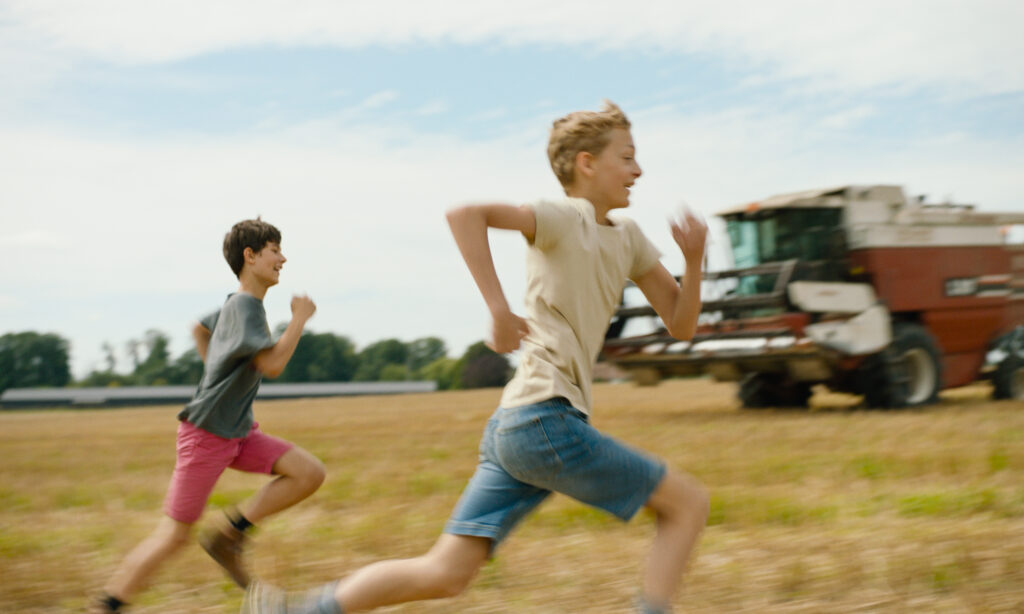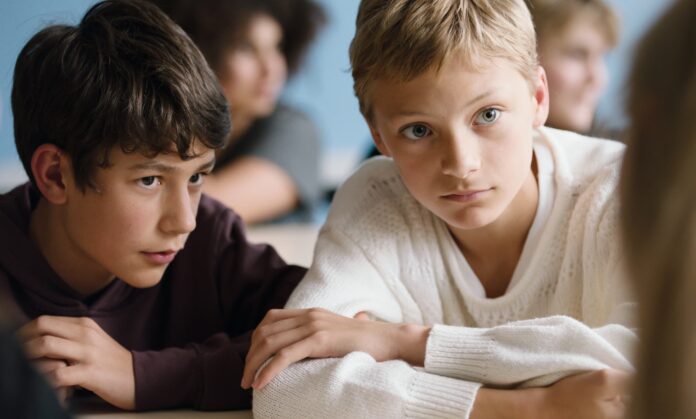Out gay director Lukas Dhont’s Oscar-nominated “Close,” scheduled to open in Philadelphia February 10, is a beautiful, heartbreaking drama about Léo (Eden Dambrine) a thirteen-year-old boy in Belgium, whose best friend is Rémi (Gustav De Waele). The boys are seen playing, riding bikes, and running through a field together. They often lie down on the ground with one resting his head on the other boy’s chest. When Rémi practices his oboe, Léo looks at him with such love it is palpable. Moreover, when the boys have a sleepover — which they do almost nightly — they share a bed, and Léo soothes Rémi to sleep. They often wake up spooning, not unlike lovers.
Dhont emphasizes this closeness, hence the title, so viewers fully understand the deep bond between the boys. Neither Nathalie (Léa Drucker), Léo’s mother, nor Sophie (Émilie Dequenne), Rémi’s mother, express any concerns about the teens’ intimate relationship. (The boys’ fathers are seen briefly, but also raise no issues.)
However, things start to change when Léo and Rémi go back to school. A group of girls ask if the boys are “a couple,” and Léo makes a concerted effort to insist that while they are close, they are more like brothers. Tellingly, Rémi says nothing. Yet when Léo and Rémi are lying together during a recess period, Léo moves away from Rémi, who is resting his head on Léo’s chest. This causes some friction between the boys. Other actions slowly drive the friends apart. Things get particularly intense first during a sleepover and later at school where the boys physically fight. Before long, a tragedy occurs.
“Close” never explicitly addresses the teens’ sexuality, but reading the film, both boys are gay, and only one is comfortable with his sexuality. Dhont presents the relationship between the teens in a way that allows viewers to understand the characters and their desires. Rémi truly loves Léo, and Léo loves Rémi, but Léo is afraid to admit it, overcompensating by joining an ice hockey team, which further separates him from Rémi.

The film is told largely from Léo’s point of view and Dambrine, in his film debut, gives a phenomenal performance. He represses so much of Léo’s unspoken pain and desire that “Close” gets more intense as it builds to a hoped-for catharsis. Léo refuses to eat, and he shuts down his emotions even as teachers and classmates offer him the opportunity to express his feelings.
Dhont’s approach to the sensitive material succeeds because it is so restrained. There are a few big dramatic moments — as when Léo storms out of a classroom, angry about something another student said — and many small, poignant scenes reveal what Léo is thinking, as when he has difficulty on the ice because his mind is preoccupied.
There are some episodes that are reflective. An early dinner table scene with Rémi’s family is mirrored by a scene with Léo’s family, only the mood is playful in the former, and somber in the latter. Likewise, a sleepover Léo has with his classmate from ice hockey has a very different vibe than Léo’s nights with Rémi.
But a pair of exchanges between Léo and Sophie will rip through viewer’s hearts. Sophie tries to talk with Léo to understand the rift that drove the boys — who were always so close — apart. Her patience with the young boy who is trying to process his very difficult emotions is why the film is so strong. There is no agitating Léo to talk; he is conflicted about his feelings and he articulates them in his own time. When he confides something to his older brother, Charlie (Igor van Dessel) it is quietly devastating.
“Close” shows the ripple effect of the snickering girls’ comments at school, without sensationalizing it. The abuse young queer kids receive on the playground — some boys joke about Léo having his period — is typical, but not excusable. Dhont lets viewers absorb the snowball effect these words have, especially on delicate youths.
Rémi’s character is largely in the background, but it is clear the love he and Léo share is greater than what transpires. That simple thread is what creates so much emotion in “Close.”
And Dhont captures all the sentiment just in how the boys look at each other even when they are not saying anything. Rémi’s impact on Léo is shown with incredible grace and perspicacity. This is a powerful film about queer youth and the pleasure and pain each boy experiences.

